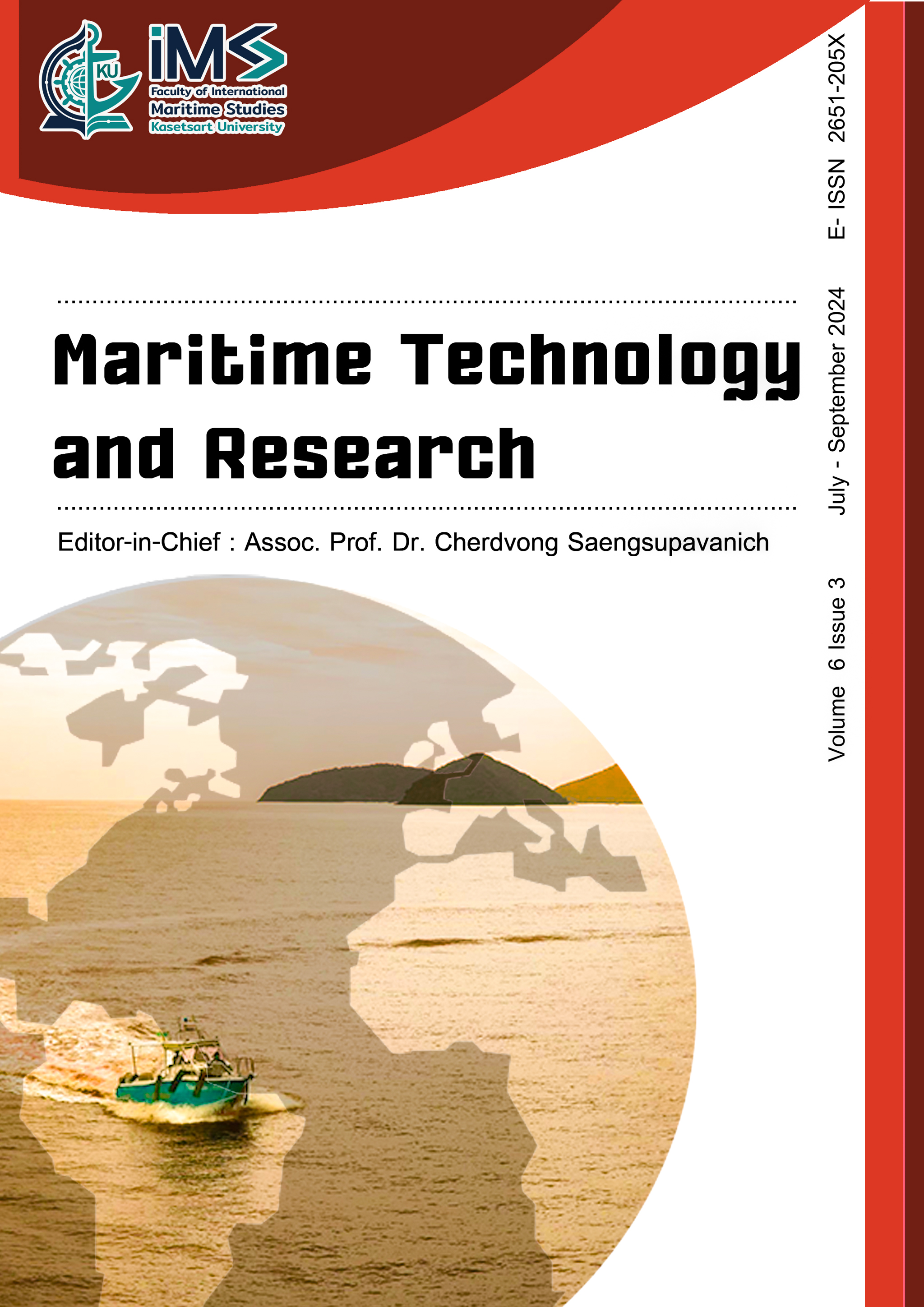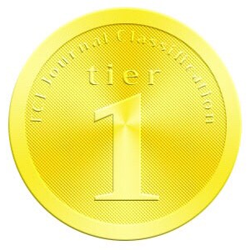Waste and hazardous material handling at green ship recycling facilities
DOI:
https://doi.org/10.33175/mtr.2024.268423Keywords:
Green ship recycling, Waste, Hazardous materials, HandlingAbstract
The study aims to develop requirements for handling waste and hazardous materials at green ship recycling facilities in Indonesia. Since the implementation of the cabotage principle in 2005, the number of ships in Indonesia has increased significantly from 6,041 in 2005 to 37,722 in 2022, with 20 percent of them being over 30 years old. This creates a significant potential for ships that are no longer economically suitable for operation and need to be recycled. Additionally, there has been a continuous increase in domestic steel demand, for which raw materials could be supplied from the scrapped steel of old ships. Despite the abundance of old ships and the demand for steel, Indonesia has not been able to utilize the opportunity, because the ship recycling industry is far from compliant with the required international standards, in particular the Hong Kong Convention, and which compliance is urgently needed, especially in conjunction with the its upcoming entering into force on 26 June 2025. Ship recycling facilities in Indonesia are still behind concerning the handling of waste and hazardous materials, which is a crucial aspect in complying with international regulations. A literature study and in-depth discussions with experts in the field of ship recycling were carried out to compare the international regulations related to ship recycling with current Indonesian conditions and, based on the findings, the requirements for handling waste and hazardous materials were developed. It is concluded that the procedure would include planning for ship recycling process flow, identifying waste and hazardous materials, and deciding requirements for handling waste and hazardous materials. It is expected that the requirements would contribute to the development of Indonesia’s ship recycling industry to comply with the international regulations and gain international recognition.
------------------------------------------------------------------------------
Cite this article:
APA Style:
Elizabeth, A., Cecilya, S., & Sunaryo, S. (2024). Waste and hazardous material handling at green ship recycling facilities. Maritime Technology and Research, 6(3), 268423. https://doi.org/10.33175/mtr.2024.268423
MDPI Style:
Elizabeth, A.; Cecilya, S.; Sunaryo, S. Waste and hazardous material handling at green ship recycling facilities. Marit. Technol. Res. 2024, 6(3), 268423. https://doi.org/10.33175/mtr.2024.268423
Vancouver Style:
Elizabeth A, Cecilya S, Sunaryo S. (2024). Waste and hazardous material handling at green ship recycling facilities. Marit. Technol. Res. 6(3): 268423. https://doi.org/10.33175/mtr.2024.268423
------------------------------------------------------------------------------
Highlights
- The ship recycling industry in Indonesia still lacks references regarding handling waste and hazardous materials
- Handling waste and hazardous materials is crucial in ship recycling activities
- Hong Kong Convention emphasizes the handling of hazardous substances and other materials in its definition of Green Ship Recycling
- Green ship recycling pays more attention to the safety and health of workers, as well as the environmental effects that arise during the ship recycling process
- Hazardous materials are classified into 3 categories: solid, liquid, and others, and each category requires a special handling method
References
Akriananta, W., & Suastika, K. (2017). Analysis of environmentally-friendly ship recycling yard development in Indonesia using ANP method: A case study of ship recycling yard in Kamal, Madura. Jurnal Kelautan Nasional, 12(1), 33-44. https://doi.org/10.15578/jkn.v12i1.6196
Andi, D. (2022). Iron and Steel Prices Expected to Rise (in Indonesian). Retrieved from https://industri.kontan.co.id/news/iisia-harga-besi-dan-baja-akan-mengalami-peningkatan
Du, Z., Zhang, S., Zhou, Q., Yuen, K. F., & Wong, Y. D. (2018). Hazardous materials analysis and disposal procedures during ship recycling. Resources, Conservation and Recycling, 131, 158-171. https://doi.org/10.1016/j.resconrec.2018.01.006
Fariya, S., Djatmiko, E. B., Sunaryo, Kurt, R. E., & Gunbeyaz, S. A. (2023). Developing Sustainable Green Ship Recycling Facilities in Indonesia: Investigation of Current Situation. Sustainable Development and Innovations in Marine Technologies. Retrieved from https://strathprints.strath.ac.uk/70029/1/Fariya_etal_IMAM2019_Developing_sustainable_green_ship_recycling_facilities_in_Indonesia.pdf
Hiremath, A. M., Tilwankar, A. K., & Asolekar, S. R. (2015). Significant steps in ship recycling vis-a-vis wastes generated in a cluster of yards in Alang: A case study. Journal of Cleaner Production, 87(1), 520-532. https://doi.org/10.1016/j.jclepro.2014.09.031
Hossain, A. (2019). Development of an Assessment Model for Ship Recycling Industry in Bangladesh. In Proceedings of the 2nd International Conference on Industrial and Mechanical Engineering and Operations Management, Narayangonj, Bangladesh.
Hossain, S. M., Mahmud, K., Yahya, M., & Navid, E. H. (2011). Ship Breaking and Recycling Industry in Bangladesh Towards Sustainable Development to Mitigate Environmental Hazards. In Proceedings of the 3rd CUTSE International Conference Miri, Gazipur, Bangladesh.
Indonesian Iron and Steel Industry Association. (2022). Development of Indonesia’s Steel Product Export-Import January-July 2022 (in Indonesian). Retrieved from https://iisia.or.id/news/eksporimpor-produk-baja-indonesia-tahun-20172022
Indonesian National Research and Innovation Agency. (2022). Development of Ship Recycling Facility in Indonesia (in Indonesian). Indonesian National Research and Innovation Agency.
International Maritime Organization. (2023). Hong Kong Ship Recycling Convention Set to Enter into Force. Retrieved from https://www.imo.org/en/MediaCentre/PressBriefings/pages/Hong-Kong-Convention-set-to-enter-into-force-.aspx
International Maritime Organization. (2023). Resolution A.962(23) Adopted on 5 December 2003 IMO Guidelines on Ship Recycling. Retrieved from https://wwwcdn.imo.org/localresources/en/KnowledgeCentre/IndexofIMOResolutions/AssemblyDocuments/A.962(23).pdf
International Maritime Organization. (2023). The Hong Kong International Convention for the safe and environmentally sound recycling of ships. Retrieved from https://www.imo.org/en/About/Conventions/Pages/The-Hong-Kong-International-Convention-for-the-Safe-and-Environmentally-Sound-Recycling-of-Ships.aspx
Irawati. (2023). Developing Safe and Environmentally Sound Ship Ship Recycling Practice in Indonesia. World Maritime University, Malmö, Sweden. Retrieved from https://commons.wmu.se/cgi/viewcontent.cgi?article=2177&context=all_dissertations
Jain, K. P., Pruyn, J. F. J., & Hopman, J. J. (2017). Material flow analysis (MFA) as a tool to improve ship recycling. Ocean Engineering, 130, 674-683. https://doi.org/10.1016/j.oceaneng.2016.11.036
Ministry of Transportation Republic of Indonesia. (2023). The Minister of Transportation Regulation Number 24 - 2022 on Amendments to the Minister of Transportation Regulation Number PM 29 - 2014 on Prevention of Maritime Environmental Pollution (in Indonesian). Retrieved from https://peraturan.bpk.go.id/Details/231385/permenhub-no-24-tahun-2022
Rahayu, A. C. (2022). Is the old ship scrap iron collecting industry promising? (in Indonesian). Retrieved from https://industri.kontan.co.id/news/menilik-industri-pengepul-besi-tua-dari-kapal-bekas-benarkah-menjanjikan?page=all
Rizaty, M. A. (2022). There are 72.313 ships in Indonesia (in Indonesian). Retrieved from https://dataindonesia.id/otomotif-transportasi/detail/ada-72313-kapal-laut-di-indonesia-pada-2021
Sunaryo, S., & Tjitrosoemarto, B. A. (2021). Integrated ship recycling industrial estate design concept for Indonesia. IOP Conference Series: Earth and Environmental Science, 972, 012042. https://doi.org/10.1088/1755-1315/972/1/012042
Sunaryo, S., Djatmiko, E. B., Fariya, S., Kurt, R. E., & Gunbeyaz, A. (2021). A gap analysis of ship-recycling practices in Indonesia. Recycling, 6(3), 48. https://doi.org/10.3390/recycling6030048
Syahputra, E. (2023). Projection of Global Steel Demand 2023 remains high (in Indonesian). CNBC Indonesia. Retrieved from https://www.cnbcindonesia.com/market/20230525134837-17-440567/dirut-kras-ungkap-permintaan-baja-global-tetap-kuat-di-2023
United Nations Environment Programme. (2023). Basel Convention of UNEP: Technical Guidelines for the Environmentally Sound Management of the Full and Partial Dismantling of Ships. Secretariat of the Basel Convention. Retrieved from https://www.ilo.org/safework/info/publications/WCMS_117942/lang--en/index.htm
Downloads
Published
License
Copyright (c) 2024 Maritime Technology and Research

This work is licensed under a Creative Commons Attribution-NonCommercial-NoDerivatives 4.0 International License.
Copyright: CC BY-NC-ND 4.0








